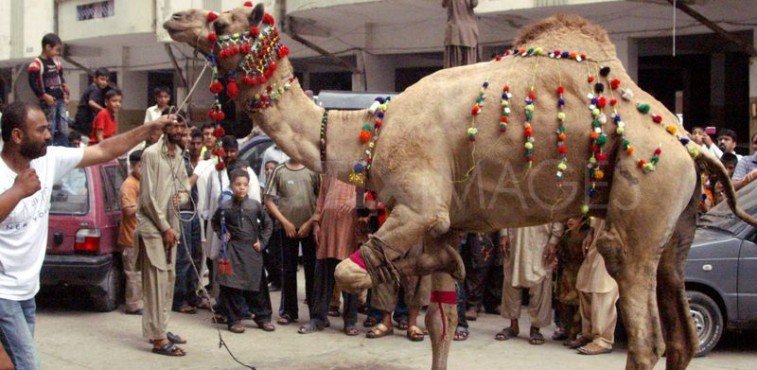Rules of Udhiyah/Qurbani
| Udhiyah/Qurbani is a religious practice that we perform on Eid Al-Adha and the following two days. It is an essential religious rite in memory of the sacrifice performed by Prophet Abraham. It involves the slaughtering of an animal (a sheep, a goat, or a cow) and offering it as a sacrifice during the tenth or the two days that follow of Dhul-Hijjah. |
Our beloved prophet Muhammed (Peace and blessings of Allah be upon him) was asked “What is Qurbani?”, He answered: “It is the sunnah of your father Ibrahim (AS), for every hair of the Qurban you will receive a reward from Allah and for every hair in the wool you will receive a reward”. (Ibn Maja and Tirmidhi).
What is Qurbani / Udhiyyah?
The history of Udhiyah/Qurbani is traced back to the dream of prophet Ibraham when he dreamt that Allah commanded him to sacrifice his only son, Prophet Ismail. He told his son the dream and Ismail entrusted himself to the Almighty and accepted to be sacrificed by his father. Due to their strong devotion and belief, Allah stopped Ibrahim from slaying his beloved son, and sent a ram to be slaughtered instead of Ismail. In short, It commemorates the willingness of Prophet Ibrahim to sacrifice his son for the Almighty.
Hence, this tradition still exist till today. On Eid Al-Adha, faithful, we submit to the will of Allah and sacrifice an animal for his sake.
Who Is Obligated to Perform the Udhiyah/Qurbani?
Some Muslim scholars (Ulama) state that Udhiyah/Qurbani is an obligation (Wajib) on Muslims who are sane, mature, and possesses an amount of 612-36 grams of Silver or equivalent wealth, which is in excess of one’s basic needs, however the majority of them classify it as a Sunnah.
Virtues of Udhiyah/Qurbani
Udhiyah/Qurbani is a practice commanded by the Almighty:
” Therefore turn in prayer to your Lord and sacrifice (to Him only).” (Al-Kauther:2)
The Prophet Muhammad (peace and blessings of Allah be upon him) said “There is nothing dearer to Allah during the days of Qurbani than the sacrificing of animals. The sacrificed animal shall come on the Day of Judgement with its horns, hair, and hooves (to be weighed). The sacrifice is accepted by Allah before the blood reaches the ground. Therefore sacrifice with an open and happy heart” (Tirmidhi p. 275, Vol.1).
Once the Companions asked; “O Rasoolullah! (SAW) What is Qurbani?” He replied, “It is the sunnah of your father lbraheem (alayhis salam).” They asked again, “What benefit do we get from it?” He answered, “A reward for every hair (of the sacrificed animal).” “And (what reward is there for animals with) wool, 0 Rasoolullah (SAW)?” they asked. “A reward”, he said, “for every fibre of the wool.” (Ibn Majah)
When the Muslim slaughters the Qurbani/Udhiyah, he is forgiven at the fall of the first drop of blood and the animal shall be brought forward on the Day of Judgment with its blood, meat etc, and shall be increased in weight seventy times more than its own weight, and thereafter it will be added to the good deeds.
Days of Udhiyah/Qurbani
The days of Udhiyah/Qurbani are the tenth, eleventh and twelfth of Dhul-Hijja. The first day is better than the second and the second is better than the last.
Time for Qurbani
In towns and cities where jumu’ah (Friday) and the Eid are performed, Udhiyah/Qurbani must not be slaughtered before the prayer of the Eid (Salat Al-Eid). If it has been offered before it, it must be repeated. Thus, the time for Udhiyah/Qurbani starts after the prayer of the Eid (Salat Al-Eid) on 1Oth Zul-HijjaH until before sunset of 12th Zul-Hijja.
The Udhiyah/Qurbani Animal
It is permissible slaughter a goat or she-goat, sheep of all kinds, cow, bull, buffalo or camel as a sacrifice.
The goat must be one year old, whether male or female. The cow, bull or buffalo must be two years old, and the camel five years. Animals that are younger are not permissible for Udhiyah/Qurbani. A sheep should be six months old at least.
Animals that are blind, one-eyed or has lost one-third or more of its eyesight ,whose horn has been broken off from the root and toothless and weak animals cannot be slaughtered as sacrifice .
Preferred (Masnoon) Method of Sacrifice
It is necessary to say Bismillahi Allahu Akbar when slaughtering the animal. If one does not know how to slaughter the animal , it is preferred to be present while someone else is sacrificing it. It is not necessary to make the intention loudly (Niyyah).




